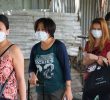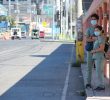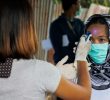DAVAO CITY, Philippines – This week, local officials in Davao are making headways in preparing for the COVID-19 vaccine said to be arriving soon. But local health faces challenge in rising cases. We break down the updates and statements they have made this week.
New public crematorium to prioritize COVID-19 cadavers
On Monday, Mayor Sara Duterte-Carpio announced that the public cremation facility located inside Davao Wireless Cemetery in Madapo Hills will be operational starting this month and will cater to COVID-19 cadavers.
The P14.8 million facility, funded through the national Bayanihan grant, aims to ease the burden of three private crematories that are serving COVID-19 cadavers since the start of the pandemic last year.
Mayor Sara said cremation expenses in the public crematorium will be shouldered by the city government. The cost of cremation ranges from P25,000 to P35,000.
But the mayor added that the operation of the public crematorium will take place on days that the private crematoriums will not operate.
62% of SPMC staff registered for COVID-19 vaccination
On Wednesday, the Southern Philippine Medical Center announced that 62% or 3,200 of its employees have signed up for the COVID-19 vaccination program.
The turnout raises concern from SPMC Officer-in-Charge Doctor Ricardo Audan, who said there are health workers who are hesitant to take the vaccine due to factors like the lack of trust in the vaccine, the Dengvaxia controversy, and influence from other people.
Audan said there is a need to disseminate clear information on the vaccines to address their concerns.
The Coalition for People’s Right to Health had pointed out that among the health workers they have encountered over the country, there are concerns about their safety and the potential side effects of the vaccine since it is newly introduced to the people.
“Health workers know that vaccines mitigate the risk of infection. Despite the data on the efficacy of the vaccine — avoiding transmission and avoiding getting infected, there are still doubts on the long-term side effects which are still uncertain at present,” the group said.
Those who had registered for the vaccine will undergo pre-screening if they are eligible for the vaccination, according to the SPMC Vaccine Advisory Committee on COVID-19. A final consent will be given on the day of the vaccination.
The National Inter-agency Task Force for the Management of Infectious Diseases has announced that the first tranche of the vaccine had arrived on February 12, as the vaccination program prioritizes frontline workers.
Cold storage for COVID-19 vaccine set up
Local health authorities in Davao City initially targeted the Southern Philippine Medical Center for the cold storage of COVID-19 vaccines but this was discouraged by national authorities.
Dr. Ashley Lopez, acting head of Davao City Health Office, said the city will instead use the cold storage facility of the Los Amigos Molecular Laboratory in Tugbok which can hold temperature as low as -80 degrees Celsius.
This is intended for the Pfizer-BioTech vaccine which requires a -70 degrees Celsius storage.
The local government has procured vaccines from Pfizer from the USA, AstraZeneca of UK which requires 8 degrees Celsius, and Sinovac of China which requires 2 degrees storage.
Lopez said that the city’s initial plan to store vaccines in the Southern Philippine Medical Center facility was discouraged by health authorities as it also stored other specimens that may contaminate the vaccines.
“(SPMC) is not fit for storage for these vaccines. It’s too risky. We don’t want to take a risk because our supply is scarce. We will incur big losses if we are going to waste them,” Lopez said over a program on DCDR Disaster Radio FM on Wednesday.
With the storage of vaccines in Los Amigos, Lopez said the vaccination will be held there since vaccines require a thawing period of at least two hours before being used.
SPMC near full occupancy for COVID-19, forcing patients to home treatment
The Southern Philippine Medical Center (SPMC) has experienced high occupancy of COVID-19 patients since January that health authorities forcing some critical COVID-19 patients to be treated at their homes.
Dr. Ashley Lopez, acting head of Davao City Health Office, said the SPMC’s 35 beds for intensive care (ICU) and 347 ward beds had recorded high occupancy since January. With rising cases in the city, patients had to wait at their homes.
Lopez said they cannot accommodate patients in isolation facilities as they need critical care treatment in SPMC.
SPMC has been the center for COVID-19 patients for Davao Region.
SPMC officer-in-charge Dr. Ricardo Audan said in one interview that they are struggling to expand more wards and beds for COVID-19 treatment because of the lack of healthcare personnel.
Lopez and Audan both said that while private hospitals have opened COVID-19 wards as part of the city’s One Hospital Command Center system, it has been a struggle for a private hospital to provide critical care.
Under the One Hospital system, 17 private hospitals are ordered to allocate 20 percent of their bed capacity for coronavirus patients.
Lopez said the Department of Health will be deploying additional personnel and provide more ventilators for SPMC.
DOH Davao Region has recorded 2,592 active COVID-19 cases as of February 12, with Davao City topping the list with 1,313. 15,429 patients had recovered while 769 deaths had been recorded.
DOH recorded that ICU occupancy in hospitals is at 67% and ventilators used at 64%.
Simulation delivery of vaccines held
On February 10, a simulation exercise was conducted in delivering COVID-19 vaccines from the Davao International Airport to the cold storage facility in Southern Philippine Medical Center.
The Philippine Information Agency Region 11 reported that the delivery was clocked at 34 minutes between the airport to SPMC which has a distance of 5.6 kilometers.
Dr. Anabelle Yumang, Director of Department of Health Region 11, said the ideal time for delivery of the vaccines should be below 30 minutes to ensure the temperature of the cold storage will not increase significantly. The health director also noted the need to figure a device to monitor temperature changes in the transport storage in the course of delivering the vaccines.
The simulation was conducted in the daytime which has high traffic of vehicles.
But after this simulation, local health authorities had opted the storage facility would be in the Los Amigos Molecular Laboratory in Tugbok which is 30.7 kilometers away.
The City Government of Davao had procured vaccines that include AstraZeneca which required ultra-cold storage and is expected to arrive in the second half of this year. (davaotoday.com)










